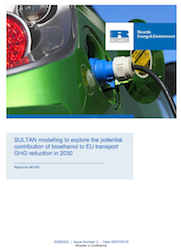 Ricardo Energy & Environment has found that a higher use of ethanol blends in Europe would contribute to a 14.1 percent greenhouse gas emissions (GHGs) reduction in the continent’s transportation sector even after taking into account possible land use change (ILUC) emissions. The new study was commissioned by ePURE and looks at the potential contribution ethanol could play in reducing GHG emissions in the transport sector through 2030.
Ricardo Energy & Environment has found that a higher use of ethanol blends in Europe would contribute to a 14.1 percent greenhouse gas emissions (GHGs) reduction in the continent’s transportation sector even after taking into account possible land use change (ILUC) emissions. The new study was commissioned by ePURE and looks at the potential contribution ethanol could play in reducing GHG emissions in the transport sector through 2030.
Building on previous research, this study focused on the introduction of E20 (20% ethanol, 80% gas) high-octane fuel, along with vehicles optimized to run more efficiently on the E20 fuel blend. Europe has set a goal of 12-20 percent reduction in emissions in the transport sector by 2030.
In particular the study found:
- Even after accounting for estimates of ILUC emissions, the use of biofuels results in significant well-to-wheel GHG reductions compared to the use of conventional fossil based fuels, i.e. petrol and diesel.
- Increasing the share of ethanol beyond 2020 levels further reduces GHG emissions. In particular, the highest GHG reductions in transport (14.1%) compared to 2005 are achieved when ethanol use is increased through the introduction of E20. This reduction is compared to a 9.3% GHG reduction in a scenario with no biofuels at all.
“European ethanol already makes a strong contribution to decarbonising Europe’s transport sector and can help to reduce the climate impacts of the fuels we use to power petrol cars,” noted Robert Wright, secretary-general of ePURE. “This study shows that ethanol’s climate benefits can be further enhanced through the use of higher ethanol blends. E20 fuel is a win-win for Europe’s climate because it significantly reduces emissions and its high-octane content increases engine efficiency resulting in less fuel consumption.”
Ricardo says its findings also validate a meta-analysis by the University of Vienna, which found that ethanol makes petrol combust more cleanly and efficiently. The study concludes that policy makers should explore the deployment of high-octane E20 fuel and vehicles with E20 optimized engines in the context of reducing transport emissions by 2030 and in the longer-term to 2050.

